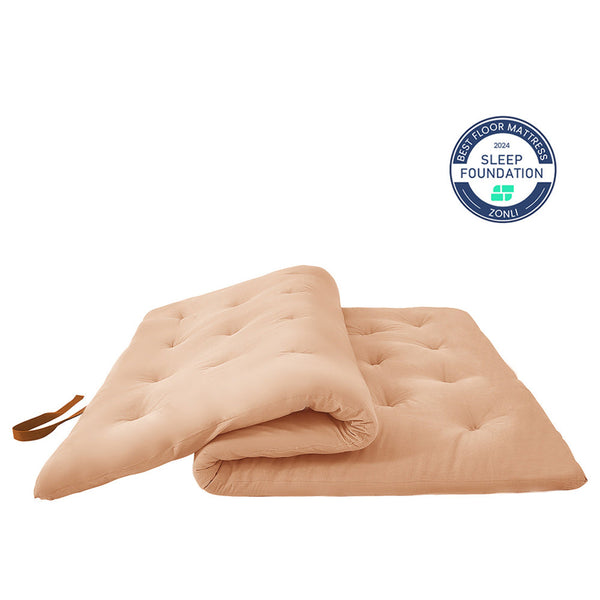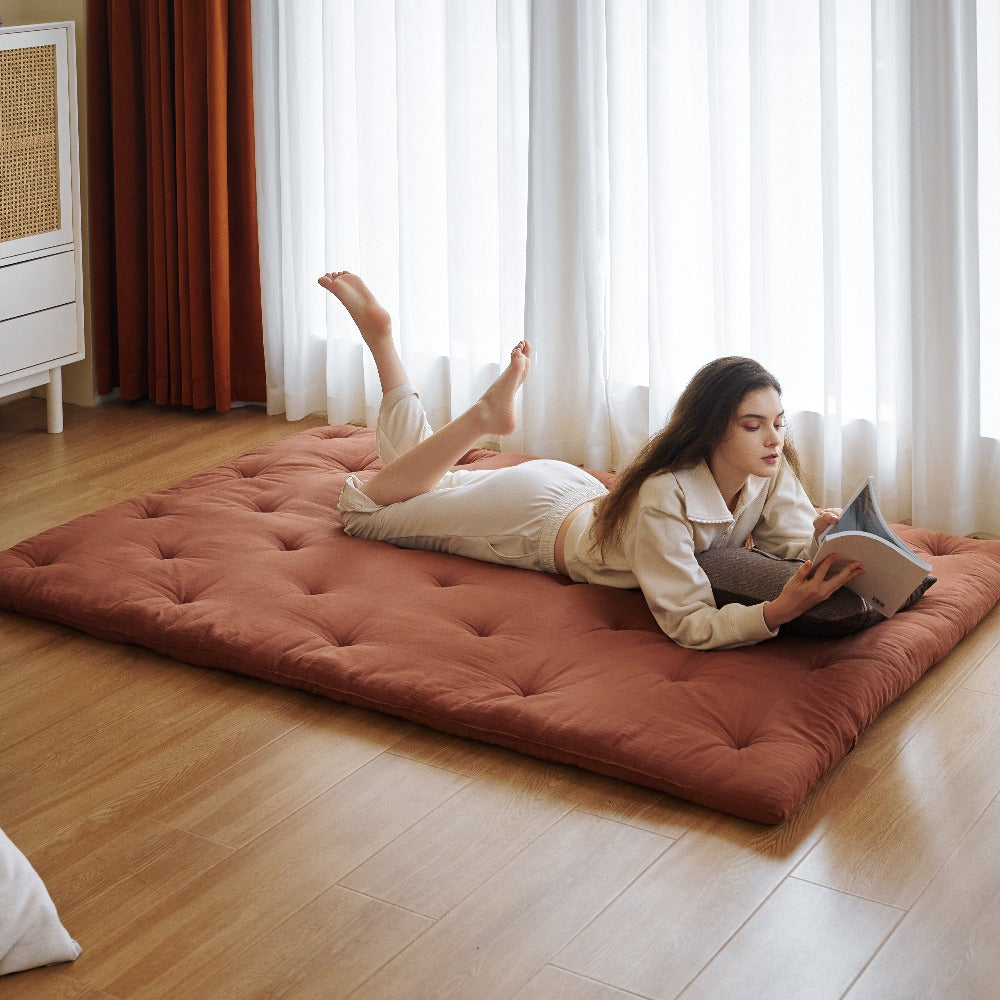Wrestling with hip pain can turn a night of sleep into a twisting, turning saga where comfort seems like a distant dream. But what if the key to peaceful slumbers wasn't found in many unhelpful remedies but rather in understanding and addressing the root of your discomfort?
This comprehensive guide explores how to sleep with hip pain and offers actionable advice on solving this dilemma.
How to Sleep with Hip Pain: A Nighttime Strategy
Hip pain and sleep form a complex paradox; discomfort disrupts sleep, while inadequate rest exacerbates pain. Breaking this cycle is crucial. Explore how the right environment, positions, and tools can transform your bedtime experience.
The Perfect Sleep Environment
Creating a sleep sanctuary is paramount. Keep your room cool, dark, and quiet. Consider adding white noise or soft, soothing music to encourage relaxation. The centerpiece of this sanctuary? Your mattress.
The Ideal Sleeping Position
Finding the correct position is a game-changer for those wondering how to sleep with hip pain. Sleep on your side with a pillow between your knees to align your hips or on your back with a pillow under your knees to reduce pressure. Avoid sleeping on your stomach, which can misalign your hips and exacerbate pain.
What is Causing Your Hip Pain?
Identifying the underlying cause of your hip pain is crucial for finding relief and determining the best course of action. This discomfort could stem from your sleeping habits or indicate a deeper health issue.
Consulting with a healthcare professional specializing in musculoskeletal conditions is essential for a precise diagnosis and to promptly embark on an effective treatment plan.
Common culprits behind hip pain include osteoarthritis, hip labral tears, bursitis, tendonitis, and sciatica. Each condition has specific symptoms and requires a tailored approach to management and treatment, underlining the importance of professional medical advice.
Sleeping Habits and Mattress Choice
In many cases, the root of hip pain during sleep isn't tied to a medical condition but to one's sleeping environment and habits. An unsuitable mattress can be a significant factor; it is too soft or too firm and might add pressure to the hip joint.
Similarly, your sleep position can be pivotal in nocturnal hip discomfort. Adjusting your sleeping position can provide relief by aligning the hips properly.
For side sleepers experiencing hip pain, switching to back sleeping, even temporarily, can offer respite. It might feel unusual at first, but the body often adapts quickly.
If back sleeping isn't feasible, try sleeping on the non-aching side and placing a pillow between your knees to maintain hip alignment.
Special Considerations During Pregnancy
Due to increased physical and hormonal changes, pregnancy introduces unique challenges to getting a restful night's sleep. The techniques mentioned above can also benefit expectant mothers by using a pregnancy pillow designed to support the changing body and alleviate discomfort, including hip pain.
Exploring Treatment Options
The treatment strategy for hip pain should be personalized based on the diagnosis. Potential treatments may include:
- Nonsteroidal Anti-Inflammatory Drugs (NSAIDs) such as ibuprofen
- Physical therapy focusing on strength and flexibility
- Dry needling as an alternative treatment form
- Steroid injections to reduce inflammation
- Arthroscopic surgery for less invasive corrections
- Hip replacement surgery for severe cases
Why Choose a Floor Mattress for Hip Pain?

Opting for a futon mattress like the ones from Zonli Home can be a strategic choice for alleviating hip pain. Sleeping closer to the ground provides a firmer support, potentially reducing the strain on your hips.
Moreover, the firmness of a futon can help maintain a neutral spine position, which is essential for minimizing discomfort. You can explore many floor mattress options to determine if this sleeping solution will solve your problem.
Navigating Nights with Hip Pain: Tips and Tricks
- Stretch Before Bed: Gentle stretching can relieve hip tension and promote better sleep.
- Heat Therapy: A warm bath or a heating pad can soothe sore hips, making it easier to fall asleep.
- Mindful Movements: Be cautious about your movements during the day and before bed. Avoid actions that exacerbate your hip pain.
Mindfulness and Relaxation Techniques
The power of the mind in managing pain should not be underestimated. Incorporating mindfulness and relaxation techniques into your bedtime routine can significantly impact your ability to fall and stay asleep despite hip pain.
- Guided Imagery: Visualizing a peaceful scene or story can divert your mind from focusing on pain.
- Deep Breathing Exercises: Slow, deep breaths can help relax your body and mind, preparing you for sleep.
- Progressive Muscle Relaxation: Tense and then relax each muscle group in your body, starting from your toes and working your way up. It can reduce overall tension and pain.
Dietary Considerations
What you eat and drink before bed can also influence your sleep quality and pain levels. Some foods and beverages can exacerbate inflammation, potentially increasing hip pain. For example, reducing intake of processed foods, sugars, and certain fats can decrease inflammation and pain.
You must also ensure you're well-hydrated throughout the day, but limit fluids right before bed to minimize nighttime disruptions. Certain herbal teas, like chamomile or ginger, can have soothing effects and may reduce inflammation.
The Role of Sleep Hygiene
Sleep hygiene refers to the habits and practices that promote regular sleep. Good sleep hygiene is crucial for effectively managing hip pain.
- Consistent Sleep Schedule: Going to bed and waking up at the exact times each day helps regulate your body's internal clock, improving sleep quality.
- Limit Screen Time: Screens emit blue light, which can interfere with your ability to fall asleep. Try to avoid screens for at least an hour before bed.
- Optimize Your Sleep Environment: Ensure your bedding and pajamas are comfortable. The Zonli Home Futon Mattress can help make your sleep environment more conducive to restful nights.
When to Seek Professional Help
If your hip pain continues disrupting your sleep despite trying these strategies, it may be time to consult a healthcare professional. Persistent hip pain can be a sign of underlying conditions that require medical intervention.
- Physical Therapy: A physical therapist can provide targeted exercises and treatments to strengthen the hip area and reduce pain.
- Medical Evaluation: In some cases, hip pain may be due to issues that require medical or surgical intervention. A thorough evaluation by a healthcare provider can determine the best course of action.
Advanced Sleep Aids and Technologies
In the quest for the ultimate night's sleep, especially for those suffering from hip pain, exploring advanced sleep aids and the latest technologies can be a game-changer. Let’s explore some innovative solutions that, combined with the previously discussed foundational strategies, can elevate your sleep quality.
Smart Mattresses and Toppers
Innovation in the mattress industry has led to intelligent mattresses and mattress toppers that can adjust their firmness in real time based on your body's needs. These products can provide targeted support to your hips, adapting as you move throughout the night to ensure consistent comfort and pain relief.
Sleep Apps and Trackers
Utilizing sleep apps and wearable trackers can offer insights into your sleep patterns and identify potential disruptions caused by hip pain. Some apps also provide guided meditation and relaxation techniques tailored to enhance sleep quality, making them a valuable tool in your sleep hygiene arsenal.
Cooling and Heating Pads
Temperature regulation can play a crucial role in managing pain and comfort levels. Cooling pads can soothe inflammation, while heating pads can relax tight muscles around the hip. Some modern sleep systems integrate temperature control, allowing for a customized sleep environment that caters to your comfort needs.
Long-term Management Strategies
While the focus has been on nightly relief, adopting long-term strategies to manage or reduce hip pain is crucial. This holistic approach can lead to more significant improvements over time.
- Regular Exercise: Engaging in low-impact exercises, such as swimming or cycling, can strengthen the muscles around your hips and reduce pain in the long term.
- Weight Management: Maintaining a healthy weight can significantly reduce the stress on your hips, alleviating pain.
- Ergonomic Considerations: Pay attention to your posture and the ergonomics of your workspace and living areas. Proper alignment can prevent exacerbation of hip pain.
Frequently Asked Questions
How can I adjust my sleep position if I have hip pain?
Try sleeping on your side with a pillow between your knees or on your back with a pillow under your knees. It helps maintain proper hip alignment and reduce strain.
Is a firm mattress better for hip pain?
Yes, a firmer sleeping surface, like the Zonli Home Futon Mattress, can provide the support needed to keep your spine and hips in alignment, potentially alleviating pain.
Can exercises help with hip pain at night?
Absolutely. Low-impact exercises and stretching can strengthen the muscles around the hips, reducing pain. Consult with a physical therapist for a tailored exercise plan.
Final Thoughts
Finding comfort when struggling with hip pain at night can feel like a daunting task, but it doesn't have to be. With the right approach, from optimizing your sleep environment to adjusting your sleeping position and making simple lifestyle changes, relief is within reach.
Remember, managing hip pain is about adopting a holistic approach that includes the right sleeping environment, posture, and lifestyle adjustments. Here's to better nights and brighter mornings!

